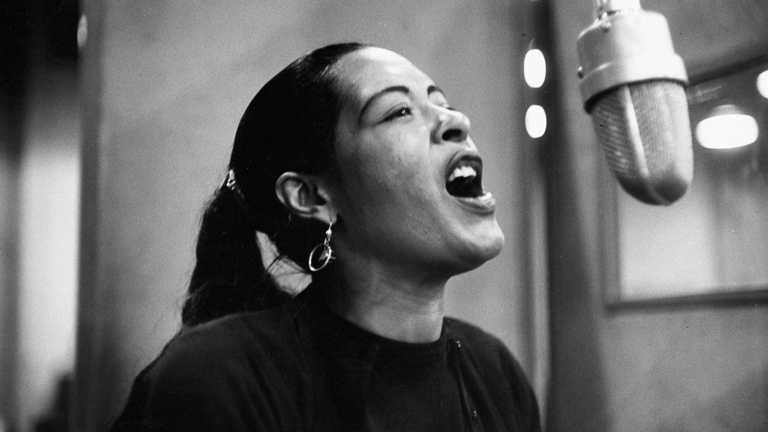So much of Billie Holiday’s art, including her fondness for the French ballad “My Man,” underscores the pathos of her life and the masochistic tendencies that kept her involved and often enthralled with those who hurt her most. She inhabited a world that either failed to appreciate her unique gifts or exploited them at every turn. By most accounts, her mother lacked any real feeling for her daughter’s needs, while her husbands, lovers, and agents were reprehensible by any standard. Billie was as hopelessly addicted to violent, abusive people as she was to alcohol and narcotics.
But no singer ever elevated personal anguish to such a soulful, tenderhearted level of human expression as Billie, and rarely was she seen to such good advantage before TV cameras as she is here on Stars of Jazz on August 13, 1956. Lady Day sings “Please Don’t Talk About Me When I’m Gone,” “Billie’s Blues,” and “My Man,” on the ABC production hosted by songwriter Bobby Troup. She’s accompanied by Corky Hale on piano, Jules Bertaux on bass, and Robert Neel on drums. (Thanks to Toby Byron for helping me track this down.)
Billie’s centennial is on April 7. I’m featuring her even more prominently than usual throughout the year in Jazz à la Mode, and that means a lot of Lady Day. We’ll hear Billie tonight on the great studio recordings she made for Commodore in 1944. Her performances of “Embraceable You,” “Billie’s Blues,” and “He’s Funny That Way” were made when she was about 30 and in peak form. Tomorrow night we’ll hear Billie on her first studio session with Lester Young and other members of Count Basie’s orchestra. Dating from January 25, 1937, just weeks after the Basie band’s arrival in New York, the mythical musical romance between Prez and Lady Day (her nickname for him and his for her) would continue on records for the next four years. In Friday’s Jazz à la Mode, we’ll hear some nightclub and concert performances by Billie in the 1950’s.
